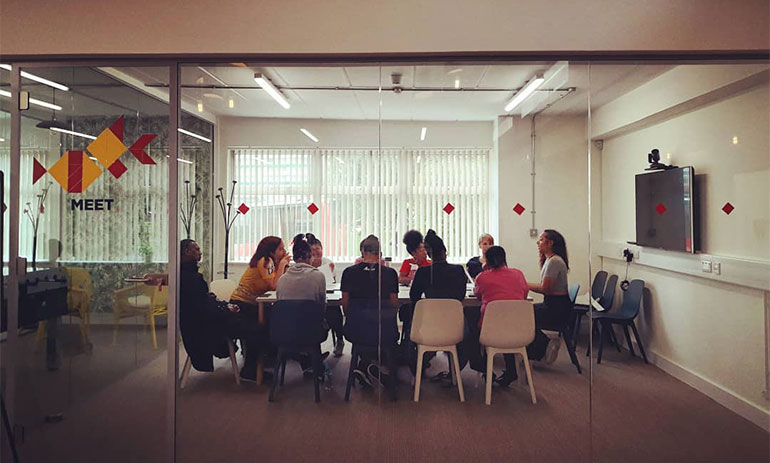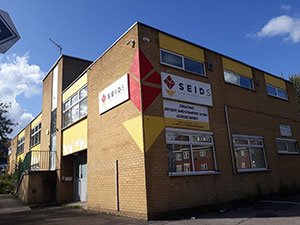Why we need a different type of social enterprise hub in Australia
The current social enterprise system favours the white middle class. It will take a different approach to give those from disadvantaged backgrounds the opportunity to be the authors of their own change and to deliver a social enterprise that rivals any other.
In December 2019, Ms Rose Blossom was awarded the Pride of Brent Award for its Fly Girls project, a social enterprise providing services for black women and girls in Wembley, London. Amanda Epe, a black woman, is the founder of Ms Rose Blossom. How did she do it?
Amanda was the first member of the Social Enterprise Ideas Development (SEIDs) Hub – a social enterprise incubator in London, but not as we know it. SEIDs is designed for people from disadvantaged backgrounds who have a social enterprise idea, but who the traditional social enterprise ecosystem isn’t set up to support.

The social enterprise system favours the white middle class
Social enterprises often focus on creating job opportunities for people who are living with disadvantage because they do not have sustainable income from work. The general approach is to develop opportunities that create jobs for people who are out of work. The work is provided by those with the resources – especially finance – to do so.
In the social enterprise sector access to resources – financial and otherwise – are more readily available to white middle class “heroic” entrepreneurs, who create new social businesses as a result of their access to these finances and resources.
But where are the opportunities for people with scant financial resources, no savings to invest, living day-to-day on totally inadequate welfare income, who have a business idea? With no available cash or any other resource to access the support they need to commence their own social enterprise or ethical small business as a pathway out of poverty and unemployment, where do they go?
Is it even feasible in a “business” or “impact investing” sense to consider that people living with day-to-day disadvantage and poverty could have a business idea? And that given the right support and opportunity this business idea could provide them, and others, with sustainable income from work and a secure future?
There’s a different approach – feasibility indicator one: a government inquiry
Released in August this year, the Inquiry into sustainable employment for disadvantaged jobseekers (Parliament of Victoria, Legislative Assembly, Economy and Infrastructure Committee) paints a grim picture: “… types of employment barriers experienced by jobseekers facing disadvantage will persist and are likely to intensify following the COVID-19 pandemic. Increased competition for fewer job vacancies will also make it harder for these jobseekers to gain employment”. Add to this the analysis by Deloitte Access Economics that 150,000 fulltime job losses are predicted when the coronavirus supplement ends and the grimness is confirmed.
So how to respond? The Inquiry into sustainable employment for disadvantaged jobseekers makes two relevant findings:
- Finding 52 – Social enterprises that employ jobseekers facing disadvantage provide an important stepping stone for these jobseekers to move into mainstream employment.
- Finding 54 – Assisting jobseekers from disadvantaged backgrounds to start a small business helps them gain financial independence and can lead to creating jobs and employing jobseekers from similar backgrounds.
Both these findings suggest that assisting job seekers from disadvantaged backgrounds to start a social enterprise or ethical small business will assist them to gain financial independence and can lead to them creating jobs and employing jobseekers from similar backgrounds.
There’s a different approach – feasibility indicator two: SEIDs Hub Wembley
In 2015, I visited a disused building in Empire Way, Wembley, London with the director of Caritas Westminster.
The building – previously an Irish Catholic Social Club – was dilapidated and run-down. “What would you do with that?” I was asked. I suggested that with a bit of work the premises would be a great space to host a social enterprise incubator – but not one of the traditional types already on offer around London.
What followed was several papers focused on options and strategy, a feasibility analysis, a business plan, several grant applications, numerous conversations and discussions with staff and board members, and key internal and external stakeholders, especially the local Wembley community.
The result was SEIDs – Social Enterprise Ideas Development – a new social enterprise hub, open for business on 1 October 2018.
SEIDs is different… and it works
The differentiator for SEIDs amongst other social enterprise “hubs” is its offer of financial support packages to people who would otherwise be excluded from access to business development and support to commence their own small business /social enterprise as a pathway out of poverty.
Since 2017 SEIDs has attracted capital funds of £600,000 to refurbish the premises in Empire Way, £230,290 from the Brent local government Neighbourhood Community Infrastructure Fund for specific programmes, £224,000 from trust and foundations to provide financial support packages, and £280,000 to underwrite operational costs from the project sponsor Caritas Westminster – in total £1.4 million, the equivalent of approximately A$2.6 million.
SEIDs Hub has 65 members after 22 months of being open for business (the last six-months impacted significantly by COVID-19). The majority of members are those who have qualified for a financial package (valued between £3,750 ? $6,700 AUD) and who are from a Black, Asian and Minority Ethnic (BAME) background – in Australia the equivalent cohort is identified as CALD – with around one-third of members self-financing their engagement with the hub. This mix of self-financing members and those on a financial support package is another “differentiator” at the hub.
What’s on offer at SEIDs?

All members have access to a physical space with individual and collective work desks, break-out space, private and group meeting rooms and a separate fully equipped training facility. Additionally, two tailored programmes are offered for those who are eligible for a financial support package: The SEIDs Pre-Start Up 12 Week Program for 15 participants delivered in partnership with the School for Social Entrepreneurs (SSE). The program offers seven free practical weekday evening learning sessions over 13 weeks, a £500 grant, and a community of other people starting up projects in Brent to meet regularly, gain peer support and work through challenges together.
The SEIDs 12-month Start Up Business Program offers up to 25 participants the tools, resources, networks and confidence to set up and develop their own business. This program is for anyone who is unemployed, on benefits or who has been struggling to find enough work and who can access a financial support package. The program offers 12 workshops, a £500 grant on completion of a viable business plan, access to specialist mentors, access to a business coach and open access to the SEIDs co-working space. The first program that commenced in September 2019, and the current program commencing this month, are fully subscribed with a waiting list for the next cohort to commence.
Both the 10-week and 12-month programs have been designed with and delivered by people from the Brent community and others who are outside that community, to ensure accessibility and appropriateness of language and content.
The learning approach and style is focused and tailored to the needs of all its members, particularly BAME (CALD), migrant and refugee communities as well as the long-term unemployed. The focus is on peer-to-peer learning in communities of trust, support and collaboration – an ecosystem or ethos different to the “traditional” social enterprise incubators/accelerators.
With few exceptions, support for social enterprise start-ups and scale-ups follows a particular pattern – a series of workshops followed by refinement of the enterprise idea and then a pitch to a panel of potential “impact” investors. This approach is entirely unsuited to people from disadvantaged communities.
The competitive pitch approach to potential investors after a series of business grooming workshops favours a particular “style” and personality profile that is more likely apparent amongst young middle-class “changemakers” than other particular cohorts of people, and difficult to negotiate for BAME (CALD), migrant and refugee communities as well as the long-term unemployed. Ashoka some years ago ditched the pitch in favour of what it now calls “informed conversations” where everyone is around a table – not one person out front competing via a pitch performance.
What we have learnt
We have discovered many women and men are excluded because of their financial circumstances from access to social start-up support. We have also discovered that given the opportunity, they can be the authors of their own change, their own story and successfully deliver a social enterprise or ethical small business that rivals any other.
Given the impact of COVID-19 on the current and future levels of unemployment and disadvantage in Australia a SEIDs project would appear to fill a significant gap in the “social”, “for-purpose”, “impactful”, “changemaking” sector. It would generate more and more opportunities for the Ms Rose Blossoms of the world to take charge of their own futures.
We would love to hear from anyone interested in getting involved in exploring Australian opportunities.


Comments
Hi there, Thankyou for this article and sparking this important conversation here in Australia. A friend shared the link with me following airing my frustrations with the social enterprise sector here in SA focusing on impact over justice. I’m soon launching a Kalidascope Project to spark visionary organising around creating a new kind of collaborative space that centres justice and joy and transformative enterprise is something I’m really keen to explore. I feel our visions of a more just SE eco system are aligned and would love to connect further